Hiring the right call center agents is one of the most critical factors in delivering exceptional customer service—and one of the hardest to get right. A poor hiring decision can impact not only your bottom line through high turnover but also your FCR rates and overall customer satisfaction.
Too often, recruitment efforts focus on speed over strategy, leading to mismatches between agent capabilities and performance expectations. The result? Lower quality assurance scores, increased coaching demands, and unhappy customers.
This blog explores the do’s and don’ts of call center agent recruitment, helping you avoid common pitfalls and build a hiring process that supports long-term success. Grounded in SQM’s 25+ years of research and expertise in contact center quality assurance, we’ll show you how to identify top talent that not only meets metrics but also strengthens your customer experience.
1. DO Define the Right Agent Profile
Before you post a job ad or begin reviewing resumes, you need to clearly define what makes a great agent in your specific call center. Not every contact center has the same goals—and not every agent needs the same skills. A strong recruitment strategy starts with identifying the traits, competencies, and values that align with your organization’s customer experience objectives.
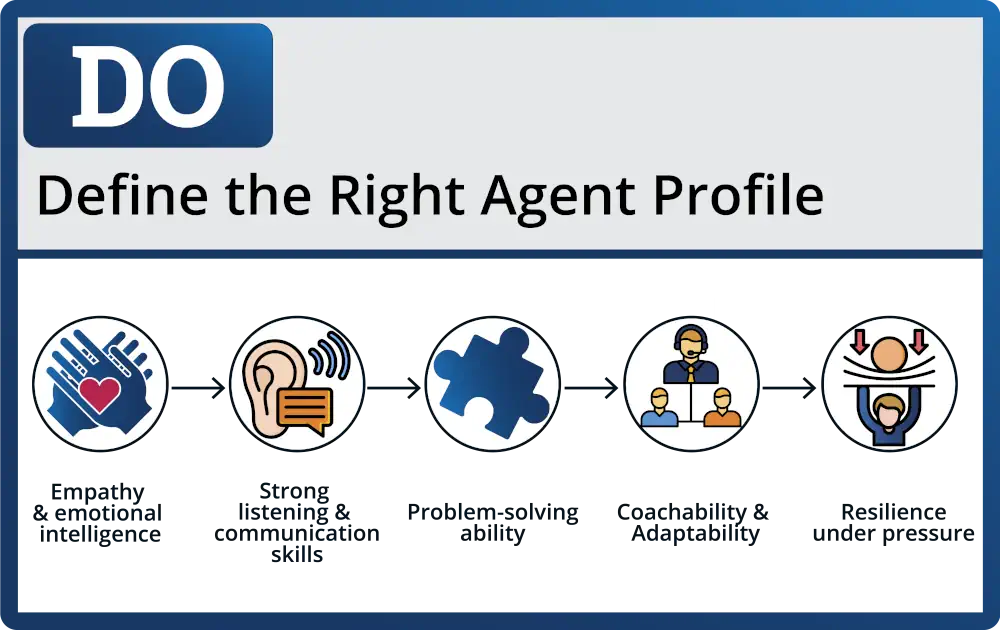
SQM’s research shows that top-performing agents—those who consistently achieve high FCR and customer satisfaction scores—tend to share certain qualities:
- Empathy and emotional intelligence
- Strong listening and communication skills
- Problem-solving ability
- Coachability and adaptability
- Resilience under pressure
Rather than defaulting to generic expectations like “friendly and punctual,” use performance data and quality assurance feedback to reverse-engineer your ideal candidate profile. For example, if your QA insights reveal that high-FCR agents frequently demonstrate proactive communication or calm conflict resolution, make those skills a requirement in your job criteria.
2. DON’T Rely Solely on Generic Job Descriptions
A common but costly mistake in call center recruitment is posting vague, templated job descriptions. Listings that simply state “answer inbound calls” or “provide great customer service” don’t help you attract the kind of candidates who can drive First Call Resolution, adapt to customer needs, or grow with your team.
Generic descriptions invite generic applicants. Without a clear picture of expectations, you’ll spend more time sifting through unqualified candidates—and risk missing out on talent who might thrive in your culture and performance environment.
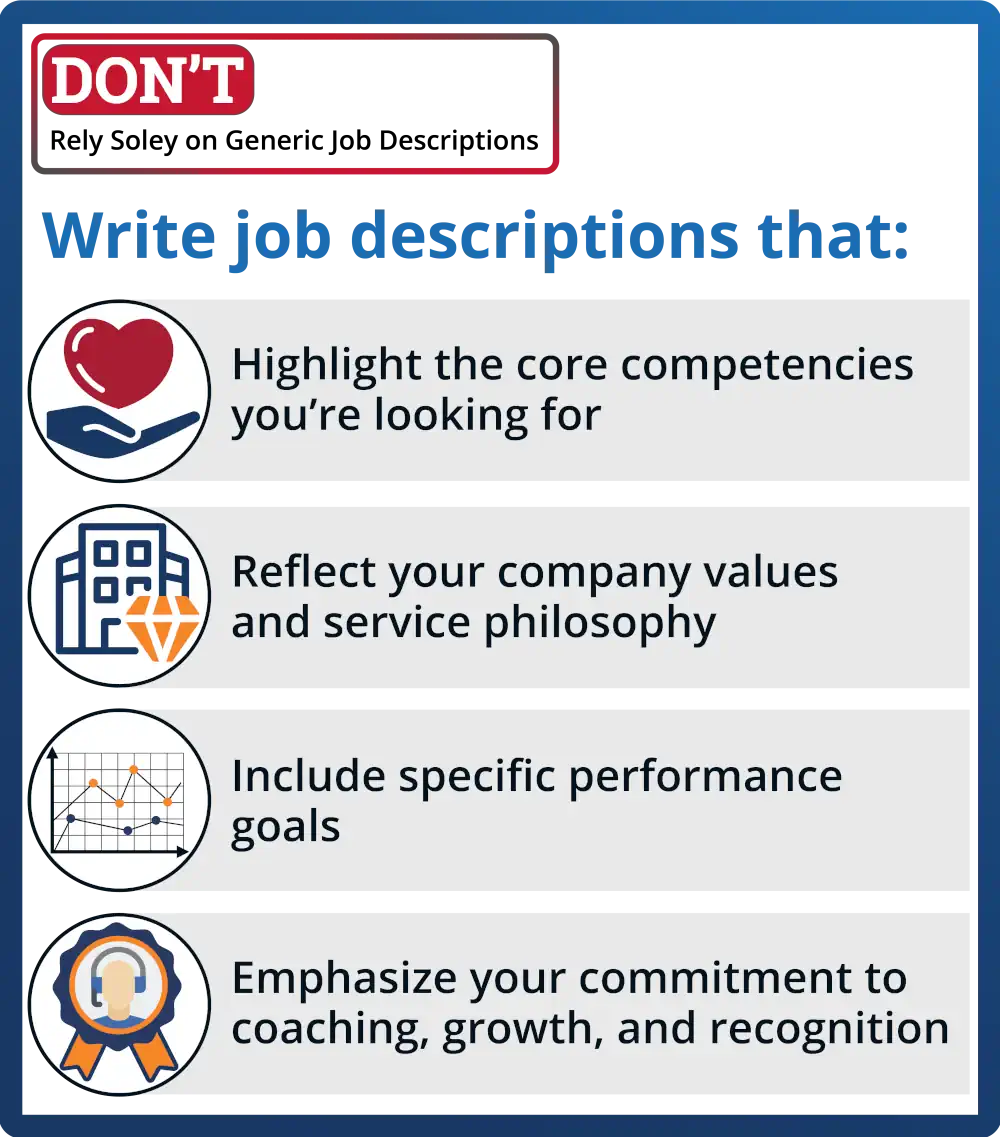
Instead, write job descriptions that:
- Highlight the core competencies you’re looking for (e.g., empathy, problem-solving, adaptability)
- Reflect your company values and service philosophy
- Include specific performance goals (e.g., FCR targets, average handle time expectations, quality score benchmarks)
- Emphasize your commitment to coaching, growth, and recognition
Here’s a quick comparison:
Generic: “Must be comfortable handling customer complaints.”
Optimized: “Able to use empathy, clear communication, and solution-oriented thinking to resolve customer concerns.”
By being more intentional in how you describe the role, you attract candidates who are not just able to perform tasks, but motivated to deliver exceptional customer experiences.
3. DO Leverage Data from QA and Customer Feedback
Recruitment shouldn’t exist in a silo—it should be informed by the real data your call center already collects. QA results, post-call surveys, and customer satisfaction scores offer powerful insights into what your best agents are doing right—and what future hires should bring to the table.
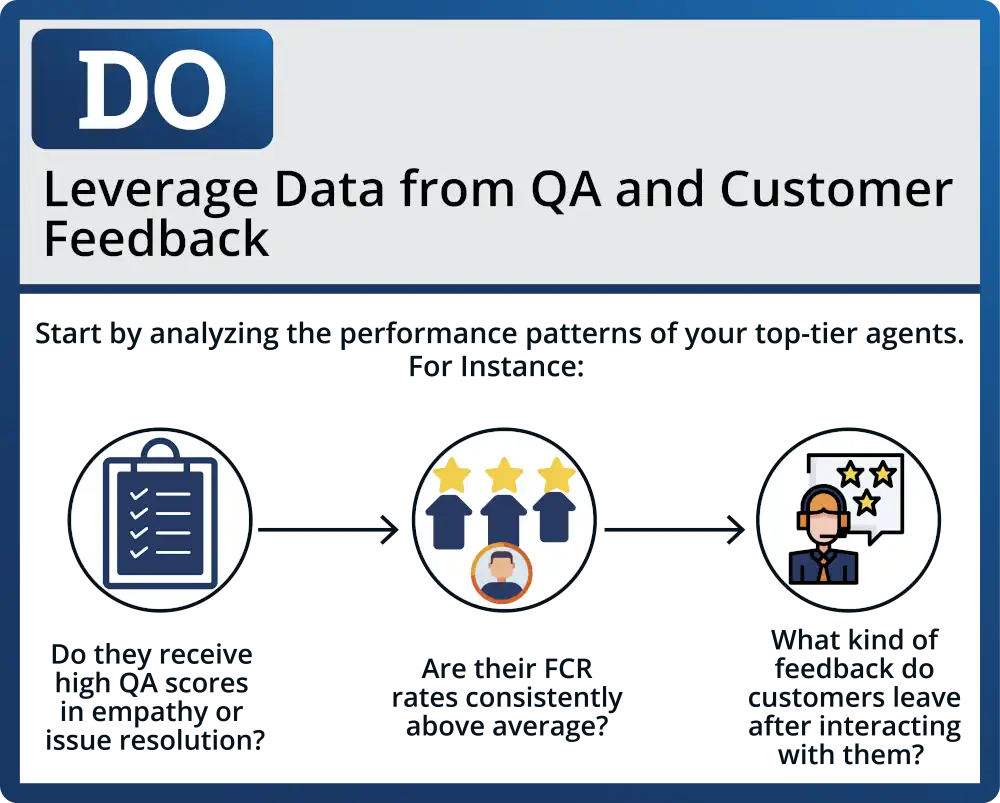
Start by analyzing the performance patterns of your top-tier agents. For instance:
- Do they receive high QA scores in empathy or issue resolution?
- Are their FCR rates consistently above average?
- What kind of feedback do customers leave after interacting with them?
These data points can help shape a more focused hiring profile. If your top agents tend to excel in navigating complex systems or calming frustrated callers, prioritize those traits during screening and interviews.
Even customer feedback can be a goldmine. If survey comments frequently praise an agent’s patience or clarity, those qualities should become key traits to screen for. And if low-performing agents struggle with multitasking or de-escalation, build questions into your process that test for those challenges.
Tools like SQM’s QA and post-call survey solutions make it easy to extract these insights—giving HR and hiring managers a performance-based foundation to build smarter recruitment practices.
By connecting your hiring process to your QA outcomes, you not only recruit better, but you set up new agents for long-term success in your specific customer environment.
4. DON’T Underestimate Cultural Fit and Retention Risk
A candidate may check every box on paper—strong communication skills, customer service experience, and even a great interview. But if they don’t align with your team’s culture or expectations, their tenure may be short-lived. And high turnover is more than an HR headache—it disrupts service quality, inflates training costs, and lowers team morale.
Retention risk is a hidden cost in many call center recruitment strategies. According to SQM’s research, turnover can increase significantly when new hires aren’t emotionally invested in the company’s mission or don’t feel a sense of team belonging early on.
That’s why assessing cultural fit and long-term compatibility is just as important as evaluating skills. This doesn’t mean hiring people who “seem like everyone else,” but rather identifying whether they share your organization’s values—especially around customer care, accountability, and openness to feedback.
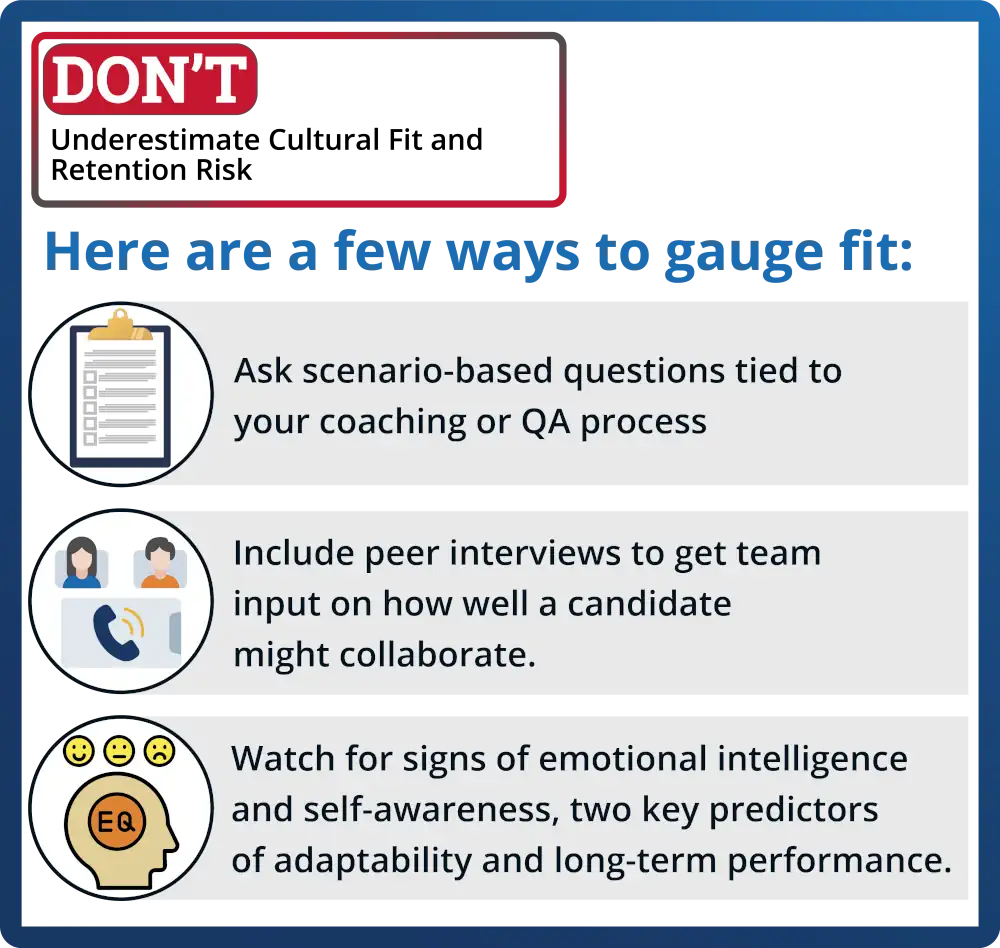
Here are a few ways to gauge fit:
- Ask scenario-based questions tied to your coaching or QA process: “How would you respond to feedback on a call you thought went well?”
- Include peer interviews to get team input on how well a candidate might collaborate.
- Watch for signs of emotional intelligence and self-awareness, two key predictors of adaptability and long-term performance.
Retention begins before day one. Prioritizing culture and values during recruitment helps ensure that new agents aren’t just qualified—they’re committed.
5. DO Optimize Your Screening and Interview Process
The traditional call center interview—basic questions, minimal testing, and vague answers—just doesn’t cut it anymore. To build a high-performing agent team, your screening process needs to uncover more than surface-level competencies. It should simulate the real demands of the job, evaluate alignment with performance metrics like FCR, and uncover coachability early on.
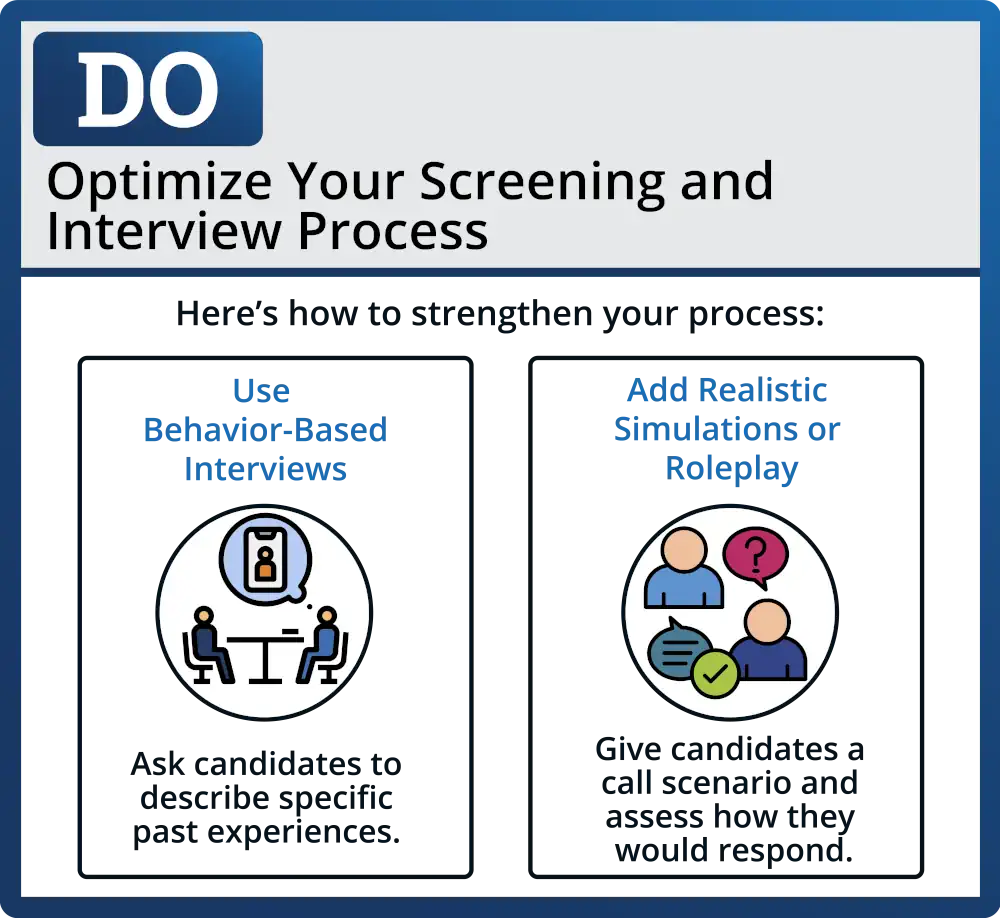
Here’s how to strengthen your process:
Use Behavior-Based Interviews
Ask candidates to describe specific past experiences. For example:
Sample Questions:
- “Tell me about a time you resolved a customer issue on the first call. What steps did you take?”
- Assesses FCR thinking and problem-solving ability.
- “Describe a situation where a customer was upset or frustrated. How did you handle it?”
- Assesses emotional intelligence and de-escalation skills.
- “Have you ever had to learn a new process or system quickly? How did you approach it?”
- Assesses adaptability and learning agility.
- “Tell me about a time you received critical feedback at work. What did you do with that feedback?”
- Assesses coachability and growth mindset.
- “Walk me through how you prioritize tasks during a high-volume day.”
- Assesses time management and ability to stay calm under pressure.
Look for responses that show empathy, initiative, and accountability—key drivers of strong QA and customer satisfaction scores.
Add Realistic Simulations or Roleplay
Give candidates a call scenario and assess how they would respond. This can reveal how well they handle pressure, solve problems, and communicate clearly in real time.
- Test for soft skills
- Soft skills are harder to teach—but critical for long-term success. Consider using short assessments or real-world tasks to evaluate skills like tone, attention to detail, and active listening.
- Include QA or coaching input
- If possible, involve team leads or QA analysts in the final decision-making. Their insights into what actually drives performance can help avoid hiring mistakes based on charisma alone.
With the right structure, your hiring process can do more than identify talent—it can predict success.
6. DON’T Skip Reference and Background Checks
It can be tempting to cut corners when you’re eager to fill positions. But skipping reference or background checks can be a costly mistake—especially when customer experience and compliance are on the line.
Reference checks offer valuable, real-world insight into a candidate’s past performance—beyond what a résumé or interview can reveal. You’re not just looking to confirm employment dates; you’re trying to understand how the candidate behaves under pressure, how they receive feedback, and whether they consistently meet performance standards.
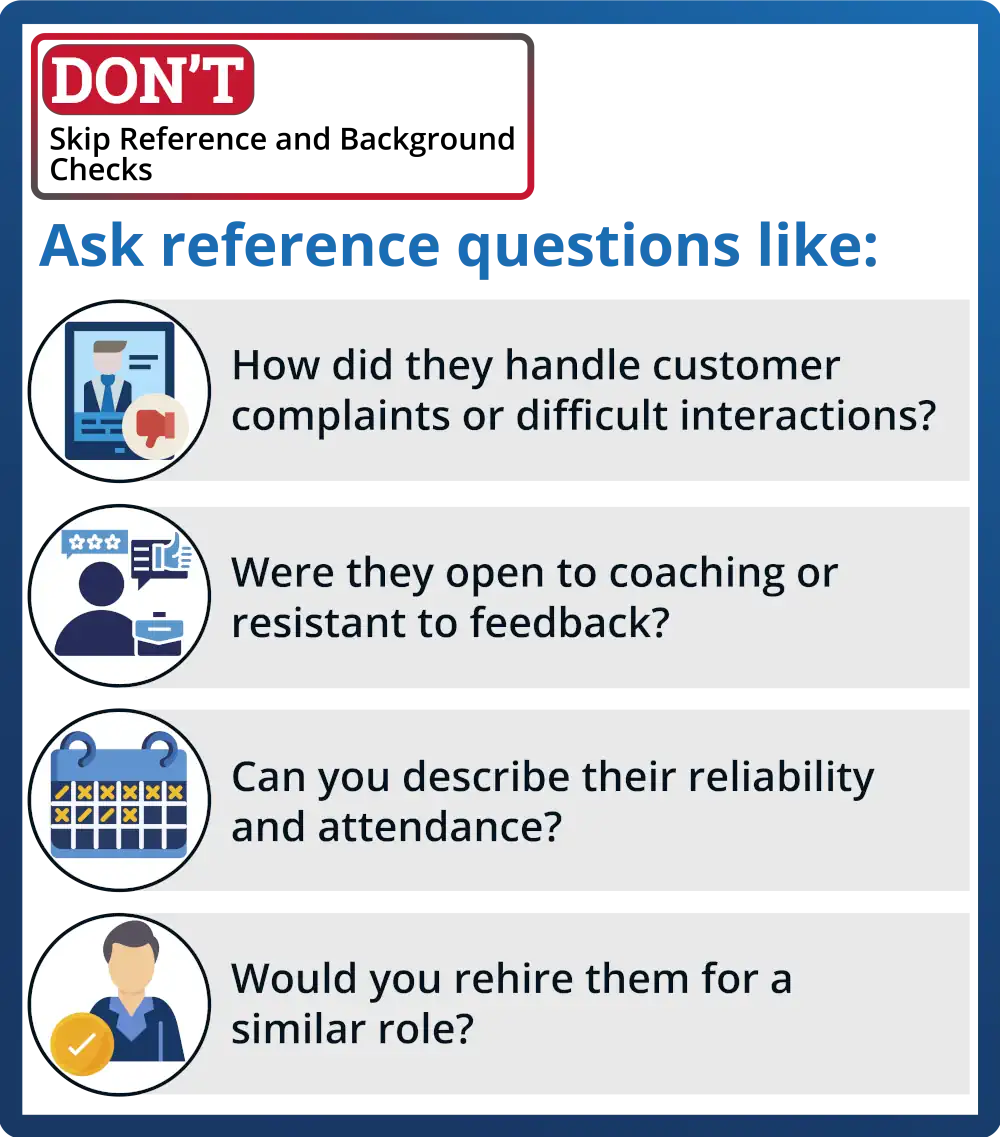
Ask references questions like:
- “How did they handle customer complaints or difficult interactions?”
- “Were they open to coaching or resistant to feedback?”
- “Can you describe their reliability and attendance?”
- “Would you rehire them for a similar role?”
These conversations can often reveal subtle red flags—or confirm you’ve found a solid, dependable fit.
Equally important are background checks, especially if your agents handle sensitive customer information. A thorough background screening ensures compliance with data protection regulations and gives peace of mind to your team and your customers.
In short, taking the extra step to verify a candidate’s history can prevent future issues, protect your team dynamic, and reinforce a culture of accountability and trust—core pillars of a high-quality contact center.
7. DO Create a Strong Employer Brand
Candidates are interviewing you just as much as you’re interviewing them. A strong employer brand—one that showcases your values, workplace culture, and growth opportunities—can be the difference between attracting top-tier talent and getting passed over.
Many call centers focus heavily on operational metrics, but neglect to highlight what it’s actually like to work there. If your organization invests in employee recognition, career development, or quality coaching programs like those offered by SQM, make that part of your public story.
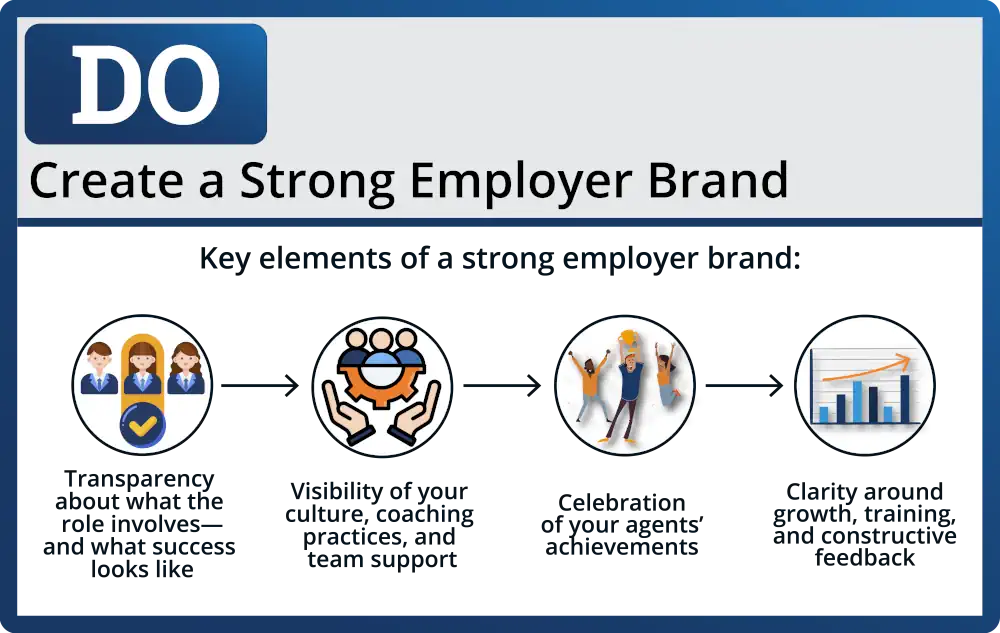
Key elements of a strong employer brand:
- Transparency about what the role involves—and what success looks like
- Visibility of your culture, coaching practices, and team support
- Celebration of your agents’ achievements (e.g., FCR improvement, QA excellence, or internal promotions)
- Clarity about growth opportunities, training, and how feedback is used to support—not punish—employees
By positioning your contact center as a place where agents are valued, supported, and recognized, you’ll attract candidates who want more than just a paycheck—they’ll want to contribute and grow. And those are exactly the kinds of agents who help raise customer satisfaction and drive consistent First Call Resolution.
